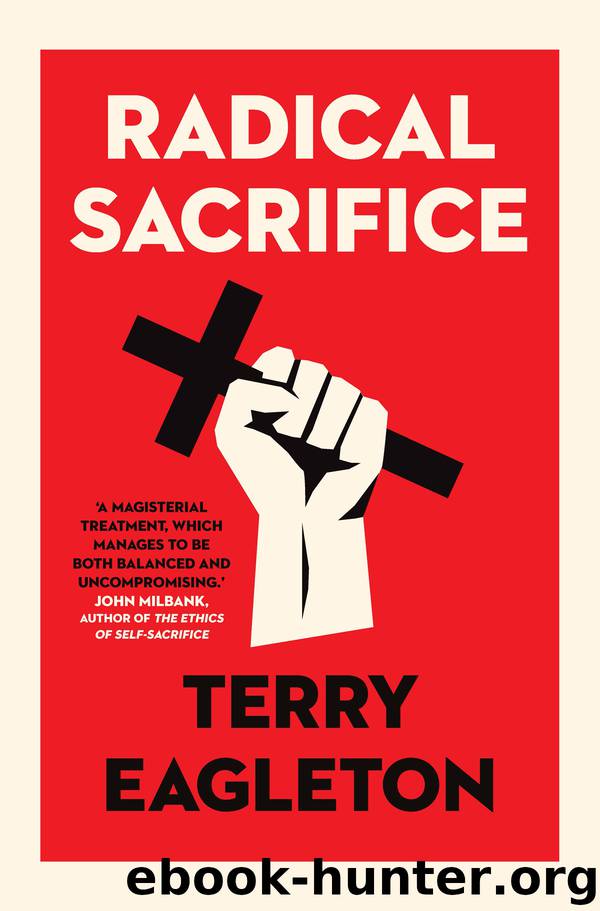Radical Sacrifice by Terry Eagleton

Author:Terry Eagleton [Eagleton, Terry]
Language: eng
Format: epub
ISBN: 9780300233353
Google: pQJQDwAAQBAJ
Amazon: 0300233353
Publisher: Yale University Press
Published: 2018-01-15T00:41:31.217000+00:00
Chapter 4
EXCHANGE AND EXCESS
THE TRUE MARTYR is the one who seeks no return, and there are those who would see this unilateral venturing of the self as the highest ethical act. Jacques Derrida, for example, holds the curious view that the act of giving is ruined by reciprocity. The case reflects his customary libertarian distaste for measure, regulation, identity, equivalence and calculability – unglamorous phenomena, to be sure, but vital to any form of social existence, and not to be dismissed without a certain offensive touch of privilege. The gift for Derrida is what interrupts economy, plays havoc with the coercive and contractual and ruptures the predictable circuit of exchange by putting an end to circulation. Marcel Mauss’s The Gift, which speaks of the need for gifts to circulate in pre-modern societies, provokes Derrida to an unusually impassioned rebuttal. ‘For there to be gift’, he writes in Given Time, ‘there must be no reciprocity, return, exchange, counter-gift, or debt’.1 One would not have wished to spend Christmas in the Derrida household. ‘To refuse the return gift of gratitude from the one to whom one gives’, John Milbank comments on this perversely self-indulgent ethics, ‘is to celebrate one’s will to give . . . instead of the miraculous and unpredictable arrival of achieved affinity and surprising reciprocity.’2 For Rabbi Eleazar ben Pedat, writing in the third century CE, the destruction of the Second Temple in Jerusalem had sundered the intimate link between God and the people of Israel, so that they were now forced to offer their prayers with no expectation of an immediate response. Unlike Derrida, however, he did not greet the situation with acclaim. Unilateralism was the consequence of a grievous alienation.3
In Anthony Trollope’s novel Framley Parsonage, the impoverished but proud-hearted clergyman Crawley tells a friend who offers him charity that ‘it is very sweet to give; I do not doubt that. But the taking of what is given is very bitter. Gift bread chokes in a man’s throat and poisons his blood, and sits like lead upon the heart.’ In Derrida’s view, a gift becomes poisonous the moment it places the recipient in debt; yet since gifts cannot avoid such a destiny, they are (in one of his most portentous terms) ‘impossible’. Indeed, he considers with solemn absurdity that the fact that a gift is a gift at all must be thrust into oblivion in the act of donation. The most valid offering is thus the one annihilated at the very moment of bestowal, which brings Derrida’s case intriguingly close to a traditional concept of sacrifice. A gift which is not acknowledged as such cannot be returned, and is thus the most absolute of offerings. It accomplishes itself in abolishing itself, and in this unconditional status reflects the immortal life of the gods. The Situationists held a similar view, concerned as they were with what one commentator calls ‘the subtle art of not returning the donation, of giving again in a way that is not circular, that does not simply pass on the debt’.
Download
This site does not store any files on its server. We only index and link to content provided by other sites. Please contact the content providers to delete copyright contents if any and email us, we'll remove relevant links or contents immediately.
The Five People You Meet in Heaven by Mitch Albom(3562)
The Secret Power of Speaking God's Word by Joyce Meyer(3196)
Real Sex by Lauren F. Winner(3021)
Name Book, The: Over 10,000 Names--Their Meanings, Origins, and Spiritual Significance by Astoria Dorothy(2987)
The Holy Spirit by Billy Graham(2946)
0041152001443424520 .pdf by Unknown(2845)
How The Mind Works by Steven Pinker(2814)
ESV Study Bible by Crossway(2777)
Ancient Worlds by Michael Scott(2684)
Churchill by Paul Johnson(2580)
The Meaning of the Library by unknow(2568)
The ESV Study Bible by Crossway Bibles(2551)
The Gnostic Gospels by Pagels Elaine(2529)
MOSES THE EGYPTIAN by Jan Assmann(2415)
Jesus by Paul Johnson(2356)
City of Stairs by Robert Jackson Bennett(2349)
The Complete Dead Sea Scrolls in English (7th Edition) (Penguin Classics) by Geza Vermes(2279)
The Nativity by Geza Vermes(2230)
Ancient Near Eastern Thought and the Old Testament by John H. Walton(2224)
